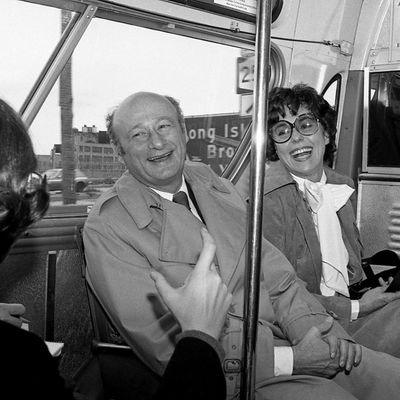
Dead at 88 on the day Neil BarskyÔÇÖs Koch, an entertaining documentary on his life, opens in New York City, former mayor Ed Koch got to watch himself on the big screen visiting his own future grave, for which he had written a fulsome epitaph. It is not ÔÇ£HowÔÇÖd I do?ÔÇØ but something along the lines of how much he loved his city and his country. His definition of love was different from othersÔÇÖ. Many gays I know ÔÇö the ones who in the eighties watched people they loved die of AIDS while the closeted mayor did little to assist them in their plight ÔÇö have expressed a desire not just to dance on that grave but also to build a dance club. The movie, however, might soften that anger. Barsky makes KochÔÇÖs arrogance so plain that you quickly move past it and concede ÔÇö along with some of the mayorÔÇÖs most obstinate critics ÔÇö that he did many remarkable and enduring things.
Barsky begins with the elderly KochÔÇÖs account of flying into New York as mayor and thinking, All this is mine. He was unself-conscious about his world-class narcissism, you have to give him that. In some respects, itÔÇÖs astounding that Koch was such a successful politician. In footage both old and new, heÔÇÖs seen refusing to engage at any length with people who disagree with him, dismissing them airily in ways that leave them open-mouthed. The problem is not that he substitutes ÔÇ£HowÔÇÖm I doing?ÔÇØ for ÔÇ£HowÔÇÖre you doing?ÔÇØ ItÔÇÖs that he doesnÔÇÖt give a damn how they answer.
Barsky cuts back and forth between Koch at the end of his life and Koch the rising ÔÇö and risen ÔÇö pol. He doesnÔÇÖt varnish KochÔÇÖs shift rightward in 1978 against mayoral opponents like Mario Cuomo. But he does make you sympathize with KochÔÇÖs 1978 beard-and-pony show, in which he held hands with Bess Myerson, the first Jewish Miss America, and broadly hinted at a marriage announcement after the election. Flyers reading ÔÇ£Vote for Cuomo, not the homoÔÇØ had been plastered all over the place, and political consultant David Garth knew his business. You might even admire the way Koch reached out to machine politicians like Meade Esposito and, most notoriously, Donald Manes, setting the stage for the seemingly endless corruption scandals of his third term. The city was in peril, and he knew he had the moxie to command attention.
It wasnÔÇÖt KochÔÇÖs fault that New York was broke, that incoming president Ronald Reagan slashed aid to the poor and flooded the streets with the homeless mentally ill, that a mysterious illness ÔÇö a ÔÇ£gay plagueÔÇØ ÔÇö appeared seemingly from nowhere and quickly killed thousands upon thousands of New Yorkers, that a new, smokable form of cocaine had devastatingly addictive properties that would ravage entire communities. The man Barsky shows us isnÔÇÖt graceful ÔÇö but heÔÇÖs not, like his predecessors, an empty suit or a well-meaning nonentity. Even KochÔÇÖs most obstinate critic, former Village Voice reporter Wayne Barrett, testifies to the mayorÔÇÖs unprecedented overhaul of a crumbling and depleted housing stock.
Barsky poses the right questions to Koch but doesnÔÇÖt bother asking them a second, third, or fourth time. He knows there are places the man wonÔÇÖt ÔÇö or canÔÇÖt ÔÇö go. Bess Myerson was KochÔÇÖs good friend, and there was never anything more! Whether heÔÇÖs gay or not is no oneÔÇÖs damn business! It would have been easier to cave in to pressure from the African-American community ÔÇö maybe he should have ÔÇö but he stuck to his principles! Blah blah blah. Koch isnÔÇÖt about to concede anything. The film opens and closes on the legislative battle over whether to affix the mayorÔÇÖs name to the Queensboro Bridge ÔÇö an ironic legacy for a man who seemed almost proud to blow up bridges between blacks and whites, gays and straights.
Whatever your view of its subject, Koch makes for a vital piece of New York history. ItÔÇÖs a canny balancing act. Watching the octogenarian mayor as heÔÇÖs snubbed by Andrew Cuomo and heckled by bystanders while campaigning for sundry New York pols, you see how much strength ÔÇö as well as egotism ÔÇö is required to shrug off the insults and move on. Time isnÔÇÖt kind to empathy-challenged exhibitionists, who have to spend more and more of it with only themselves for company. KochÔÇÖs death is foretold in Koch ÔÇö and by its end, you want him to go out with a measure of dignity. Did he hang around to read his last reviews? My guess is he wouldnÔÇÖt have missed them.


